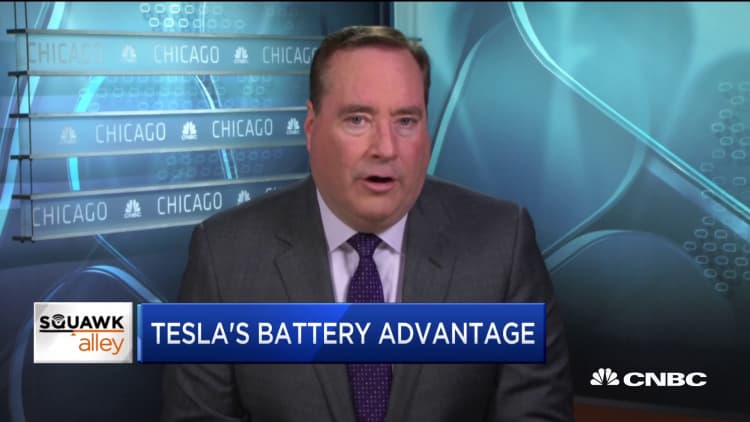
Tesla's experience in building electric vehicle battery packs is helping the electric car company extend its lead over other automakers, according to a new report.
Cairn Energy Research Advisors, a consulting firm specializing in electric vehicle battery research, says the cost of a cylindrical cell battery pack dropped to $158.27 per kilowatt-hour last year, down by more than $100 per kWh from four years ago.
Tesla is the only automaker to use cylindrical battery cells in its battery packs. Other automakers use battery packs that include pouch or prismatic battery cells. Those battery packs cost, on average, more than $200 per kWh in 2019, according to Cairn.
"Tesla simply has been engineering these packs longer than its competitors, and therefore it has a technology lead that is significant," said Sam Jaffe, Cairn's managing director.
Tesla's Gigafactory
Jaffe says Tesla has two advantages that make it the industry leader in EV battery costs: More advanced engineering and the massive Gigafactory where it manufactures battery packs. Tesla's engineering advantage, according to Jaffe, is the automaker's use of more advanced cylindrical battery cells and its battery management system, the software that controls a vehicle battery pack.
"Tesla has really revolutionized that part of the battery pack and made it much more sophisticated, and it gives them the competitive advantage," said Jaffe.
Meanwhile, Tesla's Gigafactory in Sparks, Nevada, gives CEO Elon Musk the size and scale to further drive down costs. Last year, the Gigafactory manufactured battery packs to power more than 365,000 new Tesla vehicles, with most of them for Model 3.
During Tesla's fourth-quarter earnings call with analysts Musk talked about the push to increase output from the Gigafactory. "We have got to really make sure we get a very steep ramp in battery production and continue to improve the cost per kilowatt-hour of the batteries," he said.
Competitors play catch-up
Tesla's success in building more powerful batteries and at a lower cost has sparked other automakers to announce they will spend billions of dollars to get in the EV game.
Last week, Toyota and the Japanese battery firm Panasonic, which also is a partner with Tesla at the Nevada Gigafactory, announced they will form a joint venture to develop and build prismatic battery packs that will power electric vehicles.
Meanwhile, General Motors and South Korea's LG Chem are spending $2.3 billion to build a battery plant in northeast Ohio. That plant will supply battery packs to power a slew of electric vehicles GM plans to sell over the next several years, including the new all-electric Hummer pickup truck scheduled to roll out in 2022.
Since GM first rolled out the extended range Chevy Volt in 2011 and the all-electric Chevy Bolt in 2016, critics have called GM's work in EVs underwhelming. GM president Mark Reuss defended the automaker's EV program when talking with analysts last week. "I can guarantee you that no other company is doing what we are doing because no other company can do what we are doing," Ruess said. "No one can match our combination of advanced technology, flexibility and scale."
Respect for Tesla
While GM, Toyota and other automakers believe they are laying the groundwork to eventually sell millions of electric vehicles, the big question is how quickly they can lower their EV battery costs.
Cairn ERA's forecast shows the cost of battery cells and packs moving steadily lower over the next decade. That should help those automakers become more competitive with Tesla. Still, analysts admit Tesla's head start is formidable.
"At core there is really incredible battery technology within the organization and that is material science that they have been working on for well over a decade. We think they have some substantial advantages on that," said Colin Rusch, auto analyst for Oppenheimer.
Jaffe said he believes automakers are well aware of Tesla's advantages. "I would say that five years ago when I spoke to automotive engineers about Tesla, they made fun of it. They thought it was something made in a garage," he said. "Today that's very different. They're not necessarily going to speak publicly in this way, but there's a lot of respect, and maybe envy, for what Tesla has done."
— CNBC's Meghan Reeder contributed to this article.


